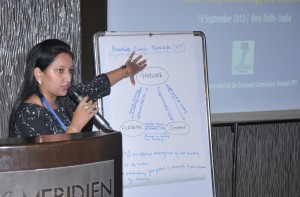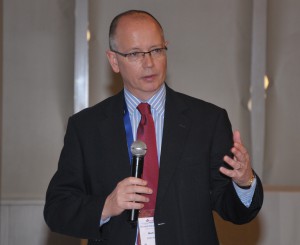26th September 2013 New Delhi, India
Exploring innovations in public private partnerships
Last week I was at a dinner with one of the professors from the University of Cambridge. Over dessert, he said something to me that changed the way I looked at the role of ‘Universities’ in the Innovation ecosystem. He told me about how he and some of his colleagues not only teach their students and do research , but also own start-ups, make money out of public speaking, consultancy and fee-for-service agreements with companies and go home to their husbands or wives in swanky luxury cars. The Vice Chancellor talked about Cambridge’s innovation strengths last week. I wondered if we have such ‘star scientists’ in India and whether it is possible to bring the Goddess Lakshmi (wealth) and the Goddess Saraswati (knowledge) together in India?
 I echoed the thoughts above and more at the first event of the EU-STI platform in India (for public health professionals reading this, STI stands for Science, Technology and Innovation). Organised together by the European S&T organizations with a representation office in India, the event focused on the issue of “Public, Private Partnership in Innovation”. More than a hundred majors stakeholders involved in India-EU partnerships attended the event. It was aimed to give the participants a unique opportunity to learn, share and discuss European and India experiences of PPP and had keynote speeches from Dr Renu Swarup (BIRAC) and Hugo Vits (Shell).
I echoed the thoughts above and more at the first event of the EU-STI platform in India (for public health professionals reading this, STI stands for Science, Technology and Innovation). Organised together by the European S&T organizations with a representation office in India, the event focused on the issue of “Public, Private Partnership in Innovation”. More than a hundred majors stakeholders involved in India-EU partnerships attended the event. It was aimed to give the participants a unique opportunity to learn, share and discuss European and India experiences of PPP and had keynote speeches from Dr Renu Swarup (BIRAC) and Hugo Vits (Shell).
The break-out sessions’ themes were –
- Latest developments in innovation and PPP policies in Europe and India
- Intellectual Property Rights and PPP
- Affordable and Inclusive Innovation and PPP
- Role of Higher Education Institutions in the Indian Innovation System
- Social dimension of innovation
Mark Sinclair (Head, SIN-India) and I were chosen to speak in the ‘Intellectual Property Rights and PPP’ session and ‘Role of Higher Education Institutions in the Indian Innovation System’ session respectively. Mark gave an overview of the IP framework in the UK highlighting the Indo-UK IP toolkit. The participants were eager to know more about the toolkit and thought that it was an immensely useful tool.
I used the Knowledge Transfer Partnership (KTP) scheme as an example from UK’s Innovation ecosystem that could work really well for India. For those of you who missed our earlier post on our innovation projects, KTP is a UK-wide programme enabling businesses to improve their competiveness, productivity and performance. The UK government has been funding this successful scheme since last 10 years. There are currently 800 partnerships across the whole of the UK. I should mention here that the SIN team in India is working with UKIERI to bring the KTP scheme to India. And if all goes as planned, we should be able to announce it later this year.
Overall the participants thought that the event was very useful in terms of networking as well as learning from the EU experience.
dear sir
there is a long list of innovations but no funds;-
1.extract of ganoderma lucid medicinal mushroom-anti cancer
2.extract of stevia used as natural sweetner by diabetes -no maker in india-from china-imports 3.cheapest water plant domestic-4.low cost sun trakker for solar-5.crep band=low cost pain remover proven with patients in AIIMS NEW DELHI
6.INNOVATIVE LOW COST TOFU PLANT 7.INNOVATIVE LOW COST ENERGY BAR FOR MIDDAY MEALS8.AEROPONICS-GROW VEGETABLES IN FLATS HIGH RISE-HSSHARMA-M-9873020599/e;-huda1921@gmail.com/www.hssharma.blogspot.com
We are running a Network of Technology Centres in Professional Colleges and would be interested to partner to bring KTP in India.